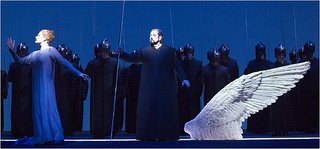 The reviews are in for Monday's premiere of the revival of Wagner's Lohengrin at the MET. I will have my own review of this production in a few days: I will be going to see it Thursday evening.
The reviews are in for Monday's premiere of the revival of Wagner's Lohengrin at the MET. I will have my own review of this production in a few days: I will be going to see it Thursday evening.Here is an excerpt from Anthony Tommasini's review in the New York Times.
It stands to reason that a high-concept new production at the Metropolitan Opera might take time to settle in and refine itself. The best example in recent years is Robert Wilson's staging of Wagner's Lohengrin.
The revival that opened on Monday night, winning huge ovations, especially for the tenor Ben Heppner as the grail knight Lohengrin and the soprano Karita Mattila as the innocent Elsa, is not the same show that earned Mr. Wilson lusty boos when the production was unveiled in March 1998. Back then the abstract scenic designs, a Wilson trademark, made for some haunting, mystical Wagnerian imagery: against a backdrop with shifting hues of blue, gray and green, slowly moving luminous white rectangular beams crisscross the bare stage. Still, the glacial movements of the singers and the highly stylized hand and arm gestures made everyone look terribly uncomfortable.
When the production returned the next season, the stylized movements had been simplified. On Monday the movements of the cast were simpler still, and the scenic designs as beautiful as ever. Finally, the astute concept behind Mr. Wilson's staging came through.
If the singers seemed self-conscious with their movements at times, for the most part Mr. Wilson's direction empowered them to give bold performances, especially Mr. Heppner. Many heldentenors are actually pushed-up baritones. Mr. Heppner is the real thing, a tenor with a clarion top range and a bright ping in his sound. His voice faltered a couple of times in the punishing Act III monologue, in which Lohengrin reveals the secrets of his origin and the reason for his mission. But it hardly mattered. This was a heroic and thrilling performance.
Ms. Mattila's singing unusually combines cool Nordic colorings with visceral emotional intensity. She was in her glory as Elsa. Coming off her winning Met portrayal of Leonore in Beethoven's Fidelio, where she acted with affecting naturalness, she was equally riveting, and stunningly beautiful, working within Mr. Wilson's stylized concept.
Making her Met debut well into her career, the American soprano Luana DeVol sang Ortrud. Though her voice was sometimes tremulous and hard-edged, she sang with fiery abandon and cut through the orchestra with slicing high notes. Despite some hammy Cruella DeVil moments, she bravely embraced the concept and was a wonderfully malevolent presence. Mr. Fink and the baritone Eike Wilm Schulte, as the king's herald, were also strong. Substituting for the bass-baritone Stephen West, who was ill, Andrew Greenan made his Met debut as King Henry, singing with robust sound until his voice tired in the last act.
Though James Levine had been scheduled to conduct this revival, Philippe Auguin proved an exciting substitute who drew a shimmering, surely paced and incisive performance from the orchestra and chorus. Mr. Auguin has a history of saving the day for Mr. Levine. He made his Met debut in 2001, conducting the new production of Busoni's Doktor Faust, after Mr. Levine withdrew.
Over all, the simpler this production becomes, the better it seems. Even Mr. Wilson, who was in the audience, would probably agree.
No comments:
Post a Comment